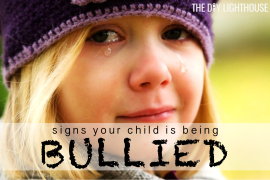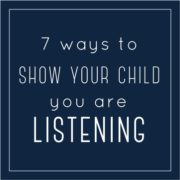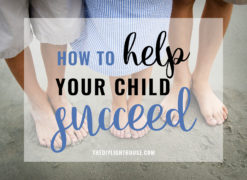If your child has low self-esteem, then they are not confident about their own worth or abilities. Well, growing up can be hard. Even if you have a loving, caring, and encouraging home, your child may develop a sense of inadequacy or low self-esteem somewhere else. There are a handful of environments a child can be influenced by: home, school, church, extracurricular activities, the playground, etc.

I had low self-esteem growing up. I was teased and had difficulty making friends during my younger elementary school years. This led to feelings of rejection and desperately wanting to be acknowledged by my peers. (I gave away all of my favorite gel pens to the popular girl on her birthday because I wanted her to like me.)
In addition, I am an identical twin which meant a LOT of side-by-side comparisons. To give you an example, I remember crying in middle school after a “cool” kid said Aubri was “the fun twin” and I was “the shy twin.” My younger self interpreted this as: Amber is not fun, and Amber is shy. These incidences led to feelings of inadequacy and not liking who Amber was.
Thankfully, I have amazing parents who really helped me avoid even lower self-esteem and helped me get over the low self-esteem I did develop. And thankfully, today I am very confident in my own worth and abilities.
10 Signs Your Child Has Low Self-Esteem
To help know if your child has low self-esteem, below are ten signs you can watch for. Your child probably won’t fit all or even most of these signs. (I certainly didn’t.) But even two or three of these could be a sign that your child has low self-esteem.
1. Giving up too soon. If your child has low self-esteem they may quit before giving something a fair shot. Or they may avoid a “failure” situation altogether.
2. Dismissing compliments or reacting badly to criticism. It can be hard for people to accept a compliment, but if your child is dismissing or deflecting compliments then they may think they didn’t deserve what was said. On the flip side, if they don’t handle criticism well either, then that could also be a sign your child has low self-esteem.
3. Talking negatively about themselves or others. People with high self-esteem think highly of themselves and others, so the opposite could be true for people with low self-esteem.
4. Showing a tendency for comparisons. If your child is constantly comparing themselves to their friends or others, then they may not like or be confident about who they are. This works both ways–they may put themselves down, or they may put others down to make themselves feel better. Either way is unhealthy.
5. Being a poor looser or getting overly emotional when they fail. Failing is normal and happens a lot. If your child has low self-esteem they may cry, get angry, or show major frustration when they fail or lose at something.
6. Having unconfident body language. This covers a bunch of things: avoiding eye contact, slouching, folding arms a lot, and generally showing physical signs of their lack of confidence in themselves.
7. Making up excuses for failures. If your child has low self-esteem, they may not like to take ownership of failures. They may also cheat or lie when they think they may lose or do poorly at something.
8. Being concerned about what people think about them. This can mean your child caves to peer pressure or does things they shouldn’t to win the approval of others.
9. Acting immature or goofy. If your child is showing signs of regression (talking or acting like a baby) or acting silly to get attention, then they may not have good self-esteem.
10. Being aggressive or bossy. If your child is being bossy or acting like a bully, then they may have self-esteem issues. Often people who push others around do so to cover up feeling bad about themselves.
Tips for Building Your Child’s Self-Esteem
If you read the signs above and think your child may be struggling with low self-esteem, I believe there are many things you can do as a parent to help. So here are tips for building your child’s self-esteem. Obviously first and foremost you should make sure to have a loving relationship with them. If that is in place, then try doing some of the things below.
1. Get them serving and doing things for other people. Serving and thinking about others helps them think less about themselves and helps them feel good for doing a good deed.
2. Avoid comparisons especially with siblings. As a parent, you can set the example and not compare in front of your child. This means don’t compare you, your child, or anyone with others. I think it is especially helpful not to compare your child with their siblings.
3. Help them have a growth mindset, not a fixed mindset. Essentially, attribute your child’s successes and failures to effort (“Good job! You must have worked hard!”), not to personal characteristics (“Good job! You must be really smart!”). Click here to read more about this philosophy.
4. Talk about self worth. You should tell and remind your child often about their self worth.
5. Talk about divine nature. This tip isn’t for everyone, but if you are religious and believe in God, then you can talk to your child about their divine nature. Something that really helped me when I was growing up was knowing that I am a daughter of God and that He loves me.
6. Support their dreams and withhold unfair expectations. Do not push your desires of what you hope your child is/becomes onto them. You may want them to play football in high school, or become a chess wiz like you are, or become a lawyer because “that’s what our family does.” Instead, ask what they are interested in and what they want to do. Support and encourage them in their dreams.
7. Show gratitude for your blessings. Set an example of being grateful. Showing gratitude helps us think outside of ourselves and focus on the good in our lives.
8. Help them come up with self affirmations. If you believe in positive vibes, then try helping your child come up with self affirmations to say every day. The more they say it, the more they will believe it, and the more likely they are to become it.
9. Give them sincere and specific compliments. You can compliment them on their unique strengths or praise them for doing something well.
10. Teach them how to accept a compliment. It is easy to dismiss compliments and it happens very frequently. (“Your hair looks great!” “Oh gosh, I feel like it’s a total mess.” Or, “You played great during the game.” “I could have caught more rebounds.”) Maybe we want to appear humble, but dismissing compliments is treating ourselves badly. We wouldn’t dismiss or argue with a compliment someone gave to our friend, so let’s not do it to ourselves. You can teach your child to just say, “thank you,” and accept the compliment given.
11. Acknowledge their small wins. If your child has low self-esteem they may fear failure, so celebrate the small victories. This could encourage them enough to keep trying.
12. Tell them you love them unconditionally. Love is key. You may think your child knows you love them, but how often do you remind them? They should never question your love, so tell them often. Also, make sure they know you will love them no matter what.
What Do You Think?
I would love to hear your experiences and thoughts. Have you noticed other signs of low self-esteem? And/or do you have other ideas for how to help a child who has low-esteem? Please leave a comment below.
Pin It For Later






